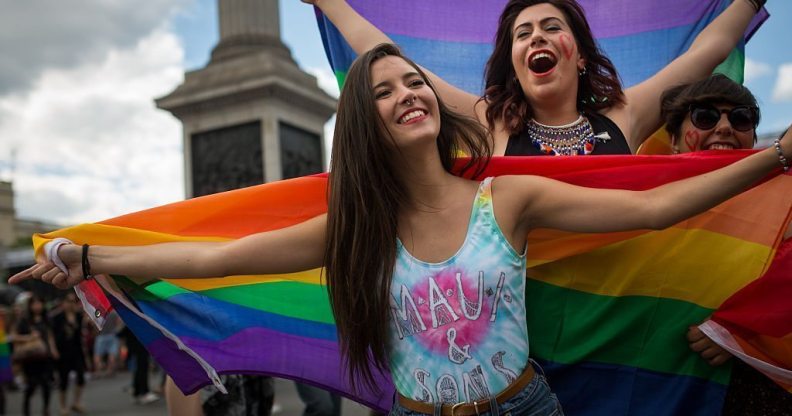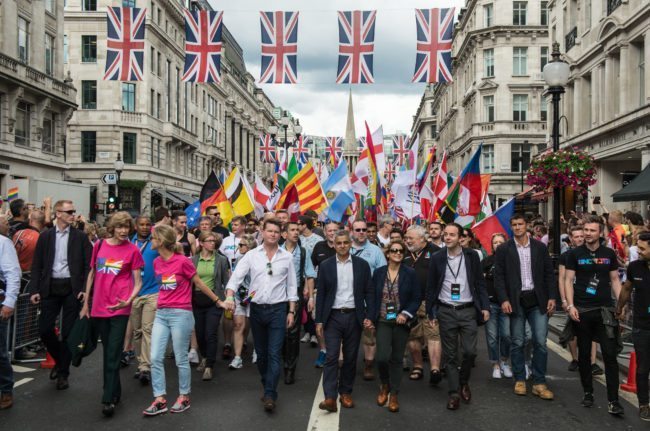Activist Peter Tatchell claims LGBT Pride has ‘lost its way’

(Getty)
Human rights activist Peter Tatchell has claimed that the Pride movement has lost its way.
Writing in The Guardian, Tatchell said that what was once a protest for gay rights has become nothing but a commercial and bureaucratic event that fails to prioritise the LGBT community.

Sadiq Khan at Pride in London in 2016 (Chris J Ratcliffe/Getty Images)
Tatchell wrote that Pride has now “morphed into a commercialised, bureaucratic and rule-bound event, which too often reflects the wishes of the city authorities, not the LGBT community.”
“The admirable organisers, Pride in London, are being forced to operate with onerous controls and draconian costs,” he continued.
Tatchell claimed that the Mayor of London, Westminster Council and the Metropolitan police are responsible for this shift, going on to say only 26,500 people will be allowed to march this year.
“This is a fraction of the number who would march if it were a free and open event.”
Organisations have to apply for Pride three months in advance, pay a fee and get wristbands for all their participants.
Tatchell suggested that this “regimented” and “straitjacketed” structure was geared towards making sure the march doesn’t disrupt central London businesses.
“Commerce comes first, it seems. Pride must not interfere with making money,” he wrote.
Tatchell went on to make references to other pollical marches that are much larger in size, such as anti-austerity demonstrations which he said have no safety problems.
He also pointed to the lack of restrictions on how many people can attend the Notting Hill Carnival, which he said was much larger.
“The tireless Pride committee is held over a barrel,” Tatchell wrote.
“They may be permitted to increase numbers, but only if they stump up loads more cash to the council and police.”
He continued: “Westminster Council seems to think that the democratic right of the LGBT community to use its streets should come at a cash price.
“Compared to 20 years ago, Pride has been dumbed down. For many people, it is now mostly a gigantic street party.
“Big corporations see it as a PR opportunity to fete LGBT consumers. The ideals of LGBT equality are barely visible.”
Tatchell attempted to denounce claims that Pride in London is the biggest Pride parade in the world.
“London is one of the smallest European cities, being eclipsed in size by Berlin, Paris, Amsterdam and Madrid,” he said.
“Pride London has 26,500 on the parade, 80,000 spectators, 20,000 in Trafalgar Square and 90,000 in Soho.
“That’s 216,500 people in total; certainly not the 1 million claimed by the mayor of London.”
Tatchell wrote that this Pride parade was smaller than earlier editions in London, and that in 1997 over 100,000 people marched in the parade and 300,000 people attended the post-festival.
He stated that Pride was about more than the march, saying it was more about the thousands of events over the Pride period, from concerts to films and sporting events to exhibitions.
“It’s staged by an amazing unpaid team of volunteers. Corporate sponsorship is necessary. The parade and festival have to be funded.
“But are the corporates now too dominant?”
Tatchell has also found support from Planet Nation, a listings and lifestyle site for LBQ women who ask whether this year’s Pride celebrations are celebrating “a community Pride or a corporate Pride.”
“Pride in London has been talking about its commitment to the community, apparently increasing its engagement and recruitment community engagement officers – but there is little evidence that this has been more than a PR exercise, no doubt to keep the sponsoring brands happy who think that they will be strengthening their brand within the LGBT community,” Planet Nation said in a press release.
“Over 50 percent of the groups in the parade this year are corporate.
“It is clear the community itself is feeling very distant and forgotten this year,” the press release continues.
Planet Nation suggests that many groups are going it alone because “being affiliated with Pride means giving the Pride organisation some of their ticket fees, and in exchange for what?
“Being listed amongst over 100 events on a website.
“There is no evidence of any money going back to the community.”
Naomi Bennett from Planet Nation said: “I’ve heard far more stories of disappointment this year than in any other.
“Given this year there was supposed to be a focus on community, the opposite seems to have happened.”
Tatchell stated that if Pride has changed and is no longer what it once was, then everyone is to blame for not being more involved with the committee and standing up to city authorities.
“The 1972 Pride was political and fun; without all the restrictions, costs and red tape that are strangling Pride today.”
“Let’s put liberation back at the heart of Pride; reclaim it as a political March with a party atmosphere and no limits on numbers and no motorised floats.”
Tatchell said this would cut costs and bureaucracy and return Pride to its roots while retaining a “fabulous carnival atmosphere.”

